Bear in mind that some of the links on this website are affiliate links. If you go through them to make a purchase we will earn a commission at no extra cost to you but helps support our website. Keep in mind that we link these companies and their products because of their quality and not because of the commission we receive from your purchases.
If you spend a lot of time in front of digital devices such as smartphones, tablets, and computers, those devices emit blue light. What does blue light do to you? well, blue light is known to contribute to digital eye strain, which could cause headaches, and disrupt our sleep/wake cycle, keeping you awake at night longer than you should be. Although more research is needed to confirm the science behind them, blue light-blocking glasses and clip-ons could help.
Table of Contents
Best Blue Light Blocking Clip-Ons
If you wear prescription glasses, there are lenses available now with blue light-protecting coatings that you are able to get, which would give you protection from blue light all day. If you already have prescription glasses but don’t have the blue light protection coating, there are a couple of ways you can still protect yourself from blue light. You can get glasses that fit over your glasses, or you can get blue-light-blocking clip-ons. These clip-ons easily clips onto your current glasses, and you can remove them when you don’t need them. Great for anyone who works for extended periods of time in front of digital devices, and wants to protect their eyes from the blue light emitting from those devices. Take a look at some of the best blue light-blocking clip-ons currently available on the market.
Best Overall: Dr. S Blue Light Blocking Clip-on
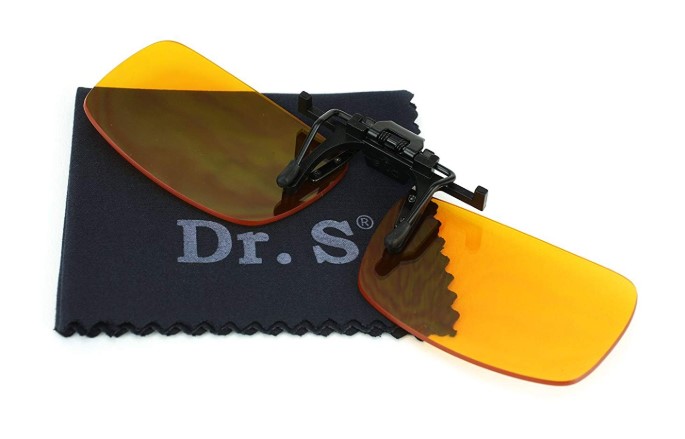
This clip-on is currently my favorite one available on the market and was specifically designed by an eye doctor using a lens material that provides excellent optics to help balance out the tint that is on the lens to provide you with sharp and comfortable vision while looking at digital devices. Along with filtering out blue light, these clip-ons also provide you with an anti-reflective coating to help with visual comfort and reduce the amount of glare reflecting off of the lenses. The tint on these lenses has been clinically tested and measured to ensure that it filters out the necessary range of blue light.
They are designed in a flip-up design makes it easy for you to flip it up whenever you do not need them. The clip comes included with a case and a microfiber cloth. These same lenses are also available in a handful of frames ranging from adult to kids sizes, and all come with a 30-day money-back satisfaction guarantee.
Swannies Fit-Over
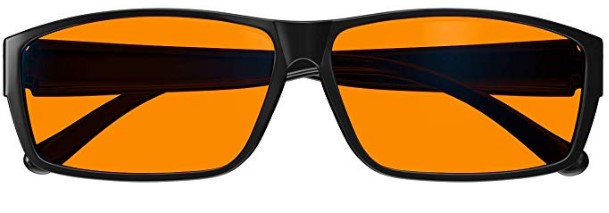
This isn’t exactly a clip-on but this pair of blue-blocking glasses are fit-over glasses. This means these are simply worn over your glasses when you need them and you can take them off when you don’t need them. This can be a great alternative to using clip-ons. I wanted to show this one to everyone because there has been some great feedback coming out of everyone that has used the Swannies whether they are just the regular blue-blocking glasses or the fit over ones. These glasses block more than 98% of blue light and can fit over pretty much any pair of glasses that you are wearing.
Spectra479 Blue Blocking Daytime/Nighttime Clip-on
This company makes one of the most high-quality and best-selling blue light blocking glasses on the market today, and now you can use that high-quality blue light blocking lens on your own prescription glasses, or even your reading glasses.
These clip ons are available in an Amber night time lens that is designed to filter out as much blue light as possible, and a daytime blue light reducing clip-on to help you reduce your blue light exposure throughout the day if you work with digital devices.
If you do a lot of work in front of a computer, or if you’re like me and have multiple computer monitors in front of you, the amber lens is a great lens to use to help filter out as much blue light as possible. Especially if a lot of that work is at night, but if you don’t mind the color you are able to use it during the day as well. The daytime clip-on is a great one to use if the amber color is too much for you but still would like to have some blue light protection the daytime clip-on is a great option.
GAMEKING Blue Light Blocking Clip-on
This is another great option for blue light blocking clip-ons. This lightly tinted lens blocks out 60% blue light overall, and a thin and lightweight but durable blue light blocking clip-on for you to add to your current prescription glasses or your reading glasses. This clip-on comes with a lifetime breakage warranty as well as a 30-day money-back guarantee.
Cyxus Blue Light Blocking Clip-on
This is a great clip-on option that is great for those individuals who do not like the amber or yellow tinted lenses but still want to be able to protect their eyes from blue light when they are looking at digital devices. This is also a great clip for graphic designers or artists that still need their eyes protected from blue light but need to be able to see in true color. This company tests all of their lenses to make they are effectively blocking out blue light before they get to you.
Gunnar Optiks Clip-On
Gunnar has been in the business of protecting our eyes from digital devices for over two decades focusing more on gamers than anything else but they have expanded their selection over the years. Specializing in a patented technology that helps protect your eyes from digital eye strain as well as blue light. Gunnar’s lenses are designed to help reduce eyestrain while providing you with better color contrast, as well as focus. These are perfect for anyone that spends extended periods of time looking at any digital device.
Don’t Wear Prescription Glasses?
If you don’t wear any prescription glasses or reading glasses, then it would be a bit difficult for you to use a blue light-blocking clip ons, therefore below I have gathered some of my favorite picks for blue-light-blocking glasses that you can use if you don’t currently wear glasses. No assembly is required.
Swannies
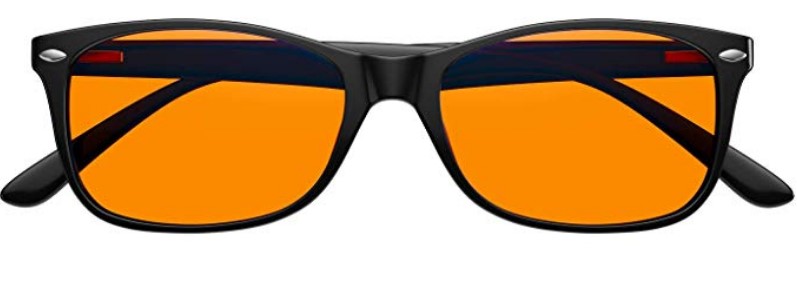
If you want to be able to have the glasses function well but still be comfortable and stylish the Swannies are the way to go. This frame uses a simple glasses frame style that is lightweight and can be adjusted to have the perfect fit. Swannies come available in different sizes ranging from kids to large so you are able to get them for anyone that spends a lot of time in front of digital devices. These glasses block over 98% of blue light and most people that have purchased them, love them.
ReadeREST Blue Light Reading Glasses
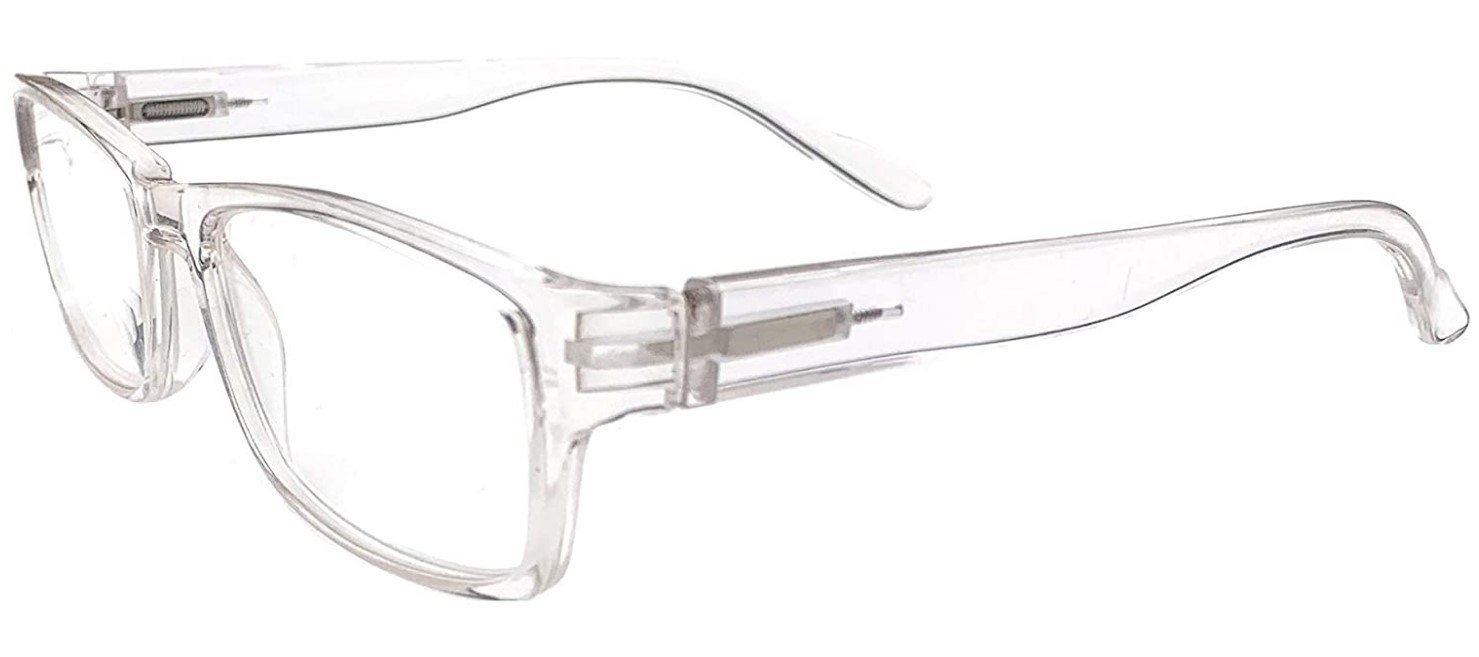
Does the name Readerest sound familiar? They make those magnetic reading glass holders that were featured on Shark Tank back in 2012. Founder Rick Hopper landed a deal with Lori Greiner and since then Readerest has been one of Shark Tank’s great success stories.
Since then Readerest has developed some blue light reading glasses that come in a wide range of different styles and sizes to suit any taste. The lenses come packed with technology and not only offer blue light protection but also come include an anti-reflective coating, scratch-resistant, and full UV protection. These glasses come in a variety of magnifications from +1.25 to +3.00 and also include ones that have no magnification for those who don’t need reading glasses. They also come in a variety of different colors, check the Readerest Store for more styles.
Uvex Skyper
If the style is the last thing on your mind when you are deciding which blue light-blocking glasses to go with, then this is your pair. This is the pair that is often used in labs and has been used in some studies. When I look at them I immediately think of safety glasses, but for a pair of glasses that absorb 98% of blue light and cost around $10, it’s not too bad.
Gunnar Enigma
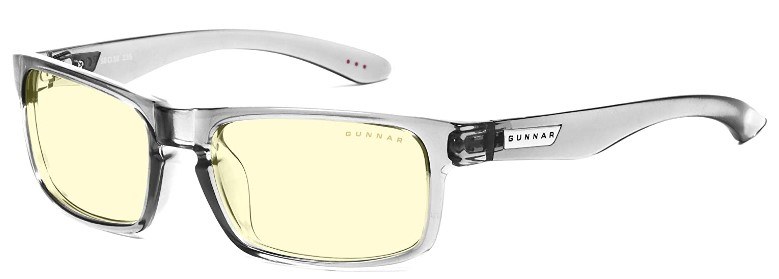
If style is more important to you then take a look at these high-quality Gunnar frames. As I mentioned above, Gunnar has been in this business for a while, and their patented technology is one of the best in the market today. These lenses filter out 65% of harmful blue light from digital devices and will help reduce the risk of long-term damage to your eyes from blue light. Gunnar tends to pay attention to every detail when they make their glasses, giving them wide lenses to give you a nice unobstructed view and protection.
Gunnar Riot
This is another stylish and simple frame by Gunnar that can provide you with protection from blue light, and still match every outfit in your closet. This is the perfect accessory for your digital lifestyle and is fitted with Gunnar’s patented technology to give you optimum protection against blue light.
Cyxus Blue Light Filter Glasses
Cyxus actually makes quite a few different styles for their blue light-blocking glasses, but this classic browline frame is my favorite one because it gives you that retro look. These lenses are also clear and do not have a tint with them, and would be perfect for anyone that needs to work in true color. You can find the rest of the styles of Cyxus blue light filter glasses here.
Why Should You Wear Blue Light Blocking Glasses?
While technology has provided us with many conveniences, this boom in technology is a worrisome issue when it comes to eye  health. You see, this technology that everyone loves so much also happens to emit blue light. This blue light isn’t the natural blue light that you can get from the sun, but this is artificially produced blue light. This blue light has always been thought to be harmful to your eyes and causes loss of vision similar to that of macular degeneration, which is the death of your photoreceptor cells. But they were never sure of exactly how blue light was affecting your eyes, up until recently.
health. You see, this technology that everyone loves so much also happens to emit blue light. This blue light isn’t the natural blue light that you can get from the sun, but this is artificially produced blue light. This blue light has always been thought to be harmful to your eyes and causes loss of vision similar to that of macular degeneration, which is the death of your photoreceptor cells. But they were never sure of exactly how blue light was affecting your eyes, up until recently.
Researchers from the University of Toledo may have discovered exactly how blue light damages your eyes. Focusing on a certain molecule that our photoreceptors require to be able to see called the retinal molecule. What they discovered was that when these retinal molecules were exposed to blue light, they were producing a toxic chemical that would actually kill the photoreceptor cells over time. Even though researchers are barely scratching the surface when it comes to how blue light affects our eyes, that doesn’t mean we can’t be more proactive about protecting our eyes from blue light.
There has been much talk about blue light-blocking glasses, and digital eye strain. But digital eye strain isn’t the only thing we are truly worried about. You can strain your eyes just as much by focusing on a book for too long. What we are worried about is protecting our eyes from the long-term damage it would get from being overexposed to blue light. Too much blue light can potentially lead to permanent damage or loss of vision, we currently don’t know for sure how much damage could even be possible with blue light from our devices but I am not risking my only two eyes. Therefore, if you spend extended periods of time in front of digital devices, it might be a good idea to wear some sort of blue light-blocking glasses.
What is Blue Light?
With so much talk about blue light and digital devices, it is important to remember that blue light isn’t just some special form of light that only emits from electronic devices.
Blue light is everywhere. As a matter of fact, our very own Sun is the biggest producer of blue light.
Blue light is just one of the seven wavelength ranges that are within the visible light spectrum. The visible light spectrum is a portion of the electromagnetic spectrum that is visible to the human eye. Here is a visual diagram for the electromagnetic spectrum.
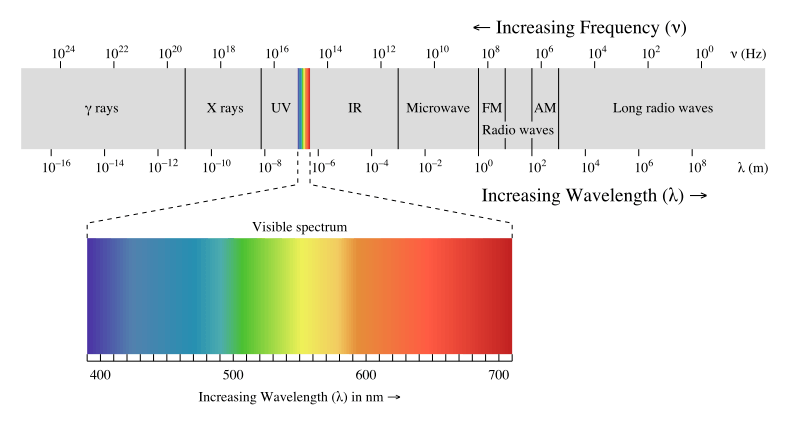
This diagram may or may not seem familiar from science class in school.
The light that emits from the sun or other light sources is made up of red, orange, yellow, green, blue, indigo, and violet light. When all of these lights combine together, it becomes the white light that we see every single day.
Each of these colors has a different level of energy and a different wavelength. Rays of visible light that are on the red end of the visible light spectrum have less energy, but longer wavelengths. Infrared light which is used in heat lamps to keep your food warm at restaurants is from this end of the electromagnetic spectrum.
Rays of light coming from the blue end of the spectrum have shorter wavelengths but higher energy. After the end of the violet visible light, you have UV, which we all know has high energy due to the sunburns we receive when we are not properly protected outdoors.
Here is a quick video that gives a great explanation of blue light, where it comes from, and how it affects you.
What Are The Sources Of Blue Light?
As I mentioned, the Sun is the biggest producer of blue light. From there, there are many other sources of blue light that you could encounter throughout your day which includes:
- Computers Monitors, Tablets, Smartphones – While the amount of blue light we are exposed to through our digital devices is small when you are comparing it to blue light that we could potentially be exposed to by sunlight. The concern here is the fact that we stare at our digital devices for extended periods of time throughout the day, and how close these devices are to our eyes.
- Fluorescent light, CFL (Compact fluorescent light) bulbs, LED – As technology has gotten better we have moved towards lighting that is much more energy-efficient but this type of lighting also emits much more blue light.
- Flat Screen LED Televisions – LED televisions produce an amazing picture, but it also emits blue light. Most newer televisions have a blue light filter that you could use at night time which adjusts the screen so that it emits a warmer tone which could be easier on your eyes.
Blue Light And Sleep Problems
It is thought that the use of artificial lighting and digital devices late at night could contribute to your sleeping problems at nighttime. Blue light may make your brain think that its daytime when it’s not and suppresses your body’s ability to create melatonin. Melatonin is responsible for making you feel tired and sleepy, letting you know that it’s nighttime and time to go to bed.
There have been numerous studies that suggest the use of digital devices that emit blue light in the few hours before your bedtime could impact your sleep. This could lead to negative impacts on your overall health and disrupt your circadian clock, which is a natural process your body uses with external cues such as light and darkness in the environment to regulate your sleep/wake cycle. This, in turn, will reduce the quality, and length of your sleep, and reduce alertness the following day.
Studies have linked the suppression of melatonin to various cardiovascular diseases and health problems such as obesity, cancer, and depression.
What Does Blue Light Do To Your Eyes?
It is important to note that your eyes are not very good at filtering out blue light. The cornea and the lens are very efficient at filtering out UV rays and keeping those harmful rays from reaching the back of your retina.
On the other hand, your eyes are not very good at filtering out blue light, or any visible light. Nearly all blue light can easily pass through the cornea and lens to reach your retina.
While more research is needed to understand the effects of blue light on your eyes fully, some early on studies have suggested that too much blue light could lead to things such as digital eye strain, or potentially even retina damage.
How To Protect Your Eyes From Blue Light
Technology and digital devices are not going away anytime soon, and it is too early to understand the full effects of how the blue light from technology can actually affect our eyes. That doesn’t mean you can’t be proactive at protecting your eyes from blue light, especially if you need to work in front of digital devices for extended periods of time.
Here are some simple and easy ways you could reduce your blue light exposure.
- Reduce Screen Time – This may not be possible if your job requires you to look at a screen all day. You can however reduce the amount of time spent just browsing the internet, or watching videos.
- Use Blue Blocking Glasses – These glasses help absorb some of the blue light and reduce the eyestrain you would get from looking at your digital devices for extended periods of time. There is a fierce debate on whether or not these glasses help, but anyone I’ve talked to that has used blue light filtering glasses that spend extended periods of time in front of digital devices has said it has helped with how tired their eyes feel from being in front of their devices all day.
- Blue Light Plugin or App – There are various plugins or apps that could adjust how your device is emitting light and switches it to a warmer tone to reduce the amount of blue light being emitted.
- Use a Screen Filter – Screen filters can be placed over your laptop or computer monitor to reduce the blue light that it is emitting. This is perfect for anyone who doesn’t want to have to wear blue light-blocking glasses every time they want to use the computer but still want blue light protection.
- Adjust Phone Settings – Many smartphones these days come with a built-in setting that changes the bright screen light to a warmer light. It is important to remember that using this setting doesn’t filter out any blue light, but the warmer tone reduces your eyestrain due to the reduced contrast between the screen and your surrounding light.
- Use Dim Red Lights – If you must have a night light on at night, use a dim red light that has the least ability to affect your melatonin production and disrupt the sleep/wake cycle.
- Avoid Devices Before Sleep – Try not to look at any bright screens in the two or three hours right before you plan on going to sleep. This will help your melatonin production from being suppressed and could help give you a better night’s sleep.
- 20-20-20 Rule – Every 20 minutes, take a 20-second break and focus your eyes on something 20 feet away. This is a simple rule but it gives your eyes a much-needed break whenever you are working for long periods of time in front of a digital device. Best of all, it only takes 20 seconds to complete.
- Get Your Eye Exam – Just like how you get a physical every year or visit your dentist every 6 months for a clean-up, you should make sure you get your routine eye exam at least once every two years. Some people feel like they don’t need to get a routine exam done because they think their prescription hasn’t changed. But it is important to remember that your eye doctor doesn’t only check your eyes to determine your vision correction but also checks your overall eye health. This ensures you don’t have any underlying conditions that could affect your eye health that you don’t know about.
- Blue Light Filtering Coatings – If you wear prescription glasses you have the option to add blue light filtering to your glasses. You could also get blue light protection by using photochromic lenses, or high-index lenses.
Final Thoughts
All blue light-blocking glasses are designed to do the same thing, filter out the harmful blue light you get from digital devices. Blue light-blocking clip ons are a great option for those who already wear prescription glasses or readers and don’t have blue light-blocking lenses. If you don’t wear glasses then there are many options for you when it comes to blue light-blocking glasses without a prescription, but make sure you go for ones made by reputable manufacturers like the ones above.
Do you use blue-light-blocking glasses? Why? or Why not? I would love to hear from you. If you have any questions don’t hesitate to leave a comment below and I will do my best to answer your question as soon as possible.
OTHER POSTS YOU MAY LIKE FROM EYE HEALTH HQ

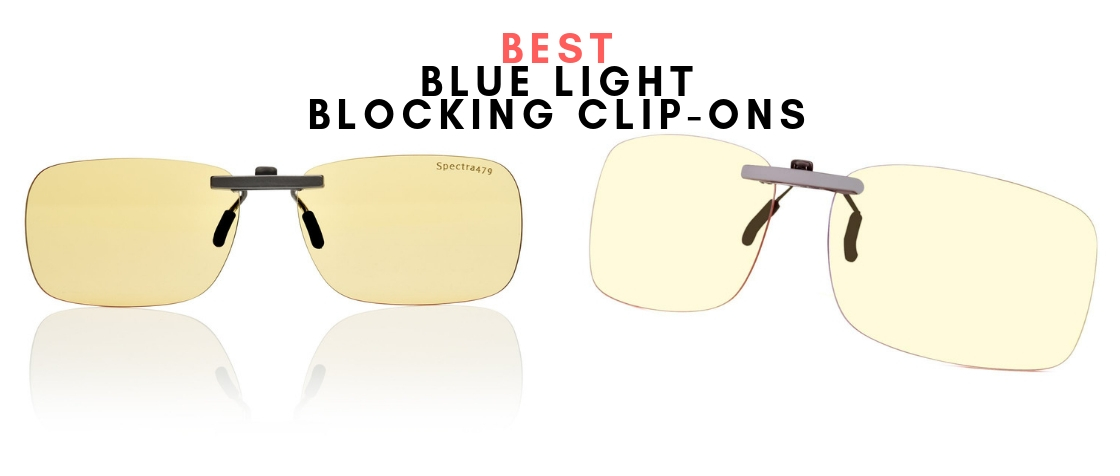








Really informative article! I had no idea how damaging blue light can be. It can be disorientating when shopping and you’re constantly bombarded by lights and digital screens everywhere! These lights can cause damage to eyes and cause headaches etc. I suffer from migraines and think they can be sometimes triggered by digital lights/ displays
These glasses sound like a great idea for anyone who may be sensitive to these lights! Great review 🙂
Woah! I wasn’t aware of this. Of course, people tell you not to spend so much time on your phone etc but I have never heard of the background of this issue. I think the Cyxus Blue Light Blocking Clip-ons would be the best option for most people since you can see as normally as with your normal reading, or prescription glasses. I suffer from retinopathy and I’m partially blind from one eye while the other is currently working over silicone oil, do these also help me prevent further damages or are the damages already done and these products don’t have any effect?
It would definitely not be bad to use blue light filtering lenses, especially since there is already damage to your retina.
I must say that you have done a great job on this article as it is very important and also informative.i have been doing alot of reading on blue light blocking glasses and I have been thinking of getting one but due to the fact that I have prescribed galsses I changed my mind but after reading your article I think I would get a clip on insted
Hey there Feji! If you didn’t get blue light filtering on your prescription glasses clip ons are a great way to get the protection without purchasing another pair.
Hello there, before now, I had little knowledge about blue light. All I knew about it was that it is not good for our eyes and that it can depreciate our sight. I got a little deep knowledge about blue lights from this post. Thank you for sharing these blue light blocking clips ons.
The colours of the clips one look exactly like the one I can see from my screen right now because I am using a software on my device to block blue light…
Regards!
Like many people I’m sure, I had no idea there was such a thing as blue light clip-ons. So I found your post very informative. It’s timely as well for me as I am dealing with a couple of eye issues.
I have just recently started getting those black spots in front of my eyes. Apparently, according to the eye doctor these are called “floaters” and are pretty common. They are pretty much harmless and more of a nuisance that anything else. I also will require cataract surgery soon.
As I don’t know that role blue light glasses would play, I wonder if they would help with either of these issues?
I spend a lot of time in front of the computer and never was aware of the blue light emanating from my dual computer screens. Considering the issues I have with my eyes and the time spent on my computer I think I will seriously consider getting a pair of these blue light clip-on glasses and at least see how they work.
I wonder…do they serve a function as sun glasses as well, or should these not be worn while driving? This time of year with the sun so low in the sky glare from the sun is very bad.
An interesting article and I’m sure people who visit your site will learn a lot from it.
Hey Ray thanks for stopping by. I would not recommend these to replace sunglasses. Sunglasses block out more blue light than these blue light filters. Hope that helps!
I love the Cyxus Blue Light Filter Glasses, Huy Le! This is a good product. Usually the glasses do not have a blue light antidote or radiation from the cellphone. But, I can find it here.
Times have changed. I remember the first time I used glasses which when worn, it would shake. Then underwent changes in terms of lenses and frames that are more stylish. Today, there are sunglasses that can ward off blue light! Cool! I think I should have 1 like this.
And by the way, do you have either clip on or glasses that are blocking UV + Blue Light?
Hey Asmadi, I believe most glasses that are blue-light filtering also offer 100% UV protection.
A very interesting article, thank you for sharing this information. I don’t wear glasses and don’t really think too much about protecting my eyes, but one of your opening statements in the article caught my attention… about how many of us are glued to our mobile and digital devices (smartphones, tablets etc.). You see it everywhere you go nowdays and it’s bound to have some effect on our eyes. Quite simply the rate of technology advancement and the rate of genetic evolution are not the same so it begs the questions… are we ready for it? I thought your quick explanation of blue light and the listing of available counter technologies is a good place to start.
Thank you for your post. It is useful knowledge for me. I am closing to 60 years old and started my online business for a while now. I sit in the front of my computer daily. My eyes get worse and worse, sometimes it is hard for me to see the letters on my computer screen. I know there is something wrong, but don’t know what.
Here comes your article. Based on your description, my eyesight change may has something to do with blue light, which is artificially produced from the electronic equipment, such as cell phones and laptop etc. The blue light is harmful to our eyes and cause loss of vision. Now I know at least one reason for my eyesight reduction and I am definitely going to use blue light blocking clips to protect my eyes.
It is kind of you sharing this useful information with us.
Thanks for stopping by! I definitely find it to be helpful and does make my eyes less tired over the course of a day on the computer.
Wahoo, thanks a million or this great information, I am a freelancer and an affiliate marketer.
I spend a lot of time on my system, never knew of the effect of the blue light on the retinal molecule as you just explained it.
I have bookmarked the Gunnar Enigma, I don’t use glasses and its ability to filter about 65% of this harmful blue light will help me. Once again, I say thank you
Thanks for stopping by!
Hello, I really want to first appreciate your effort in putting this great website together and writing this article. i have always known that blue light can be dangerous to the eyes and this is one selection of good and beautiful glasses to stop this effect on the body. this article is really helpful
Awesome! I am glad you found it helpful! Thanks for stopping by!
Wow, this is an informative article! I heard of the blue light may cause harm to our eyes but I never know it may cause retina damage as well. Nowadays, electronic gadgets that will produce blue lights is everywhere, so it seems like the best way to keep our eyes from the blue lights is to have a good glasses to block it. Besides, the clip on is a great invention for people that already own a glasses.
Thanks for sharing such amazing article, I have learned a lot in this article!
Hi Jolly, Thanks for stopping by! I am glad that you found the article helpful!
Since I ran into your previous post of anti-fog glasses. I decided to look around and I’m very glad I did! I don’t have the money right now to get myself these as well but I’m definitely going to be coming back on my next paycheck to get myself a pair of clip-ons for my glasses that should be coming in soon. Definitely going to keep looking around your website for more reviews in the future, gracias 🙂
Hi Misael! Thanks for browsing around! Let me know if there is anything I can help you find anything on the site.
Hi, Thank you very much for this wonderful article. As a person who works on a computer all day and suffers from migraines as a result I found your article informative. I will certainly be speaking to my eye specialist about getting one in the very near future.
I’m just wondering how the clip on technology would work for me considering the fact that I also wear reading glasses.
Hi Candy, The clip can over any pair of glasses and would definitely be able to go over your reading glasses if that is what you are using to work on the computer. Thanks for stopping by!
Wow i will need to tag you on my article very soon. I knew spending alot of time on screen has troubles but had never taken into consideration of the blue light. Especially now to the young ones that have been forced to study online. Protecting them before hand is a real deal.
Thank you for such an informative and helpful piece of information. It is much appreciated.
Hi there! Yeah, there are many little ones complaining about eye strain lately from all of this online studying.
Thanks for stopping by! I am glad you found the article helpful.
If you please would you list clip-ons manufactured in the U.S.A. that you sale ?